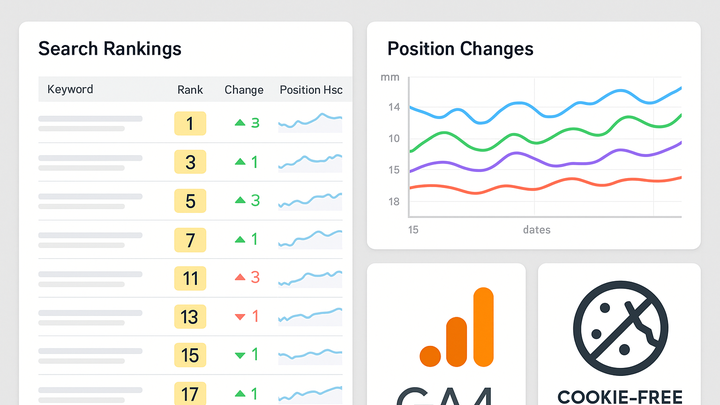Published on 2025-06-26T05:12:21Z
What is Ranking in Analytics? Examples and Use Cases
Ranking in analytics refers to the relative position of web pages or keywords in search engine results pages (SERPs) or within custom lists in analytics dashboards. Higher rankings typically yield greater visibility, leading to increased traffic and potential conversions. Ranking metrics help marketers and analysts assess the effectiveness of their SEO efforts, content strategies, and paid campaigns. While tools like Google Analytics 4 primarily focus on user behavior and page performance, integrating with Google Search Console can surface keyword ranking data. Solutions like PlainSignal offer privacy-centric page tracking, which can be augmented with custom scripts or third-party SEO tools to monitor ranking fluctuations. Understanding ranking empowers teams to optimize content, refine targeting strategies, and measure the impact of algorithm changes or UX improvements.
Ranking
Relative position of pages or keywords in search results or analytics lists, indicating visibility and performance.
Definition of Ranking in Analytics
Ranking measures where a page or keyword appears relative to others when a user performs a search or within a defined list in an analytics report. It often refers to positions 1 through n on search engine result pages (SERPs), but can also apply to ranking content by engagement metrics in internal dashboards. The concept helps prioritize optimization efforts by highlighting top-performing assets versus those that need improvement.
-
Types of rankings
Ranking can be categorized based on source or objective. Understanding these distinctions is key to choosing the right metrics and tools.
-
Organic ranking
Positions earned in non-paid search results based on relevance to user queries and SEO factors.
-
Paid ranking
Positions acquired through paid search campaigns, often labeled as ads in SERPs.
-
Internal engagement ranking
Ordering of pages or content within an analytics platform based on metrics like pageviews or dwell time.
-
Why Ranking Matters
High rankings often correlate with increased visibility, driving more organic traffic and potential revenue. Monitoring ranking trends can reveal the impact of algorithm updates or site changes. It also helps teams identify strengths and weaknesses in their SEO strategies, guiding resource allocation for content creation and technical improvements.
-
Visibility and click-through rate (ctr)
Pages in top positions receive the majority of clicks, making ranking a key driver of organic CTR.
-
Traffic and conversions
Higher-ranked pages typically attract more visitors, which can increase lead generation and sales opportunities.
Tracking Ranking with Analytics Tools
While some analytics platforms don’t directly report ranking, they can integrate with SEO-focused tools or leverage custom setups to infer ranking data. Below are common approaches using GA4, PlainSignal, and specialized SEO software.
-
Google analytics 4 (GA4)
GA4 captures user behavior on landing pages but doesn’t natively show keyword rankings. By linking GA4 to Google Search Console, you can import query and position data for combined analysis.
-
Integrate with search console
Connect GA4 to Search Console to view impressions, clicks, and average position alongside GA4 engagement metrics.
-
-
PlainSignal cookie-free analytics
PlainSignal provides privacy-focused pageview and engagement tracking without cookies. To track ranking, you can combine its event tracking with manual or automated SERP checks.
-
Tracking code
<link rel="preconnect" href="//eu.plainsignal.com/" crossorigin /> <script defer data-do="yourwebsitedomain.com" data-id="0GQV1xmtzQQ" data-api="//eu.plainsignal.com" src="//cdn.plainsignal.com/plainsignal-min.js"></script>
-
-
Third-party seo tools
Dedicated SEO platforms like Ahrefs or SEMrush offer automated rank tracking across search engines, providing daily or real-time position updates.
Best Practices to Improve Ranking
Improving ranking requires a multifaceted strategy encompassing on-page SEO, technical optimizations, and high-quality content. Regular audits and monitoring help sustain and build on ranking gains.
-
On-page seo
Optimize title tags, meta descriptions, and headings with target keywords while ensuring natural readability.
-
Technical seo
Enhance site speed, mobile usability, and structured data to meet search engine requirements.
-
Content strategy
Create in-depth, user-centric content that addresses search intent and encourages engagement signals.
